Xiancai Chen
SCoder: Iterative Self-Distillation for Bootstrapping Small-Scale Data Synthesizers to Empower Code LLMs
Sep 09, 2025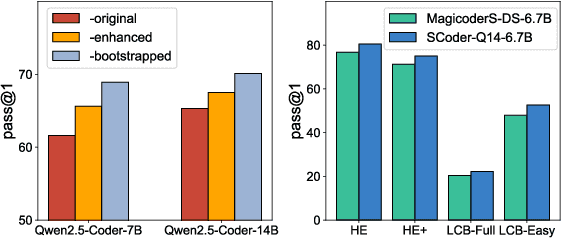
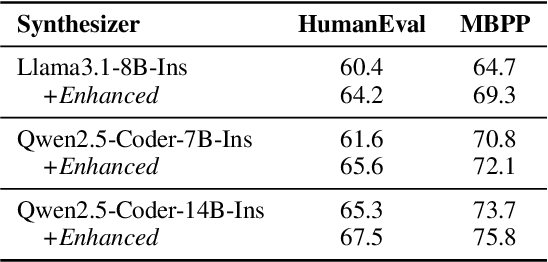
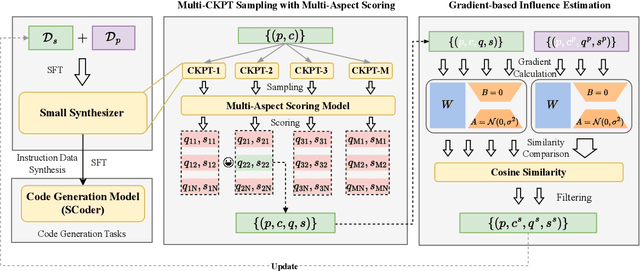
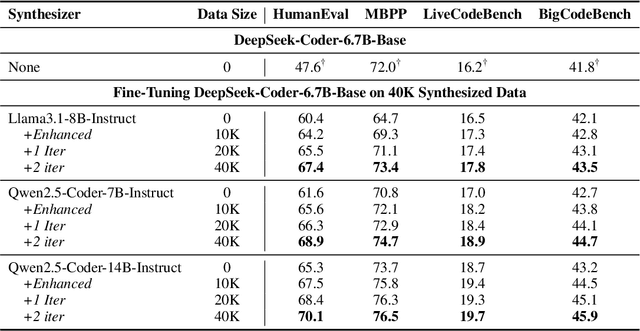
Abstract:Existing code large language models (LLMs) often rely on large-scale instruction data distilled from proprietary LLMs for fine-tuning, which typically incurs high costs. In this paper, we explore the potential of small-scale open-source LLMs (e.g., 7B) as synthesizers for high-quality code instruction data construction. We first observe that the data synthesis capability of small-scale LLMs can be enhanced by training on a few superior data synthesis samples from proprietary LLMs. Building on this, we propose a novel iterative self-distillation approach to bootstrap small-scale LLMs, transforming them into powerful synthesizers that reduce reliance on proprietary LLMs and minimize costs. Concretely, in each iteration, to obtain diverse and high-quality self-distilled data, we design multi-checkpoint sampling and multi-aspect scoring strategies for initial data selection. Furthermore, to identify the most influential samples, we introduce a gradient-based influence estimation method for final data filtering. Based on the code instruction datasets from the small-scale synthesizers, we develop SCoder, a family of code generation models fine-tuned from DeepSeek-Coder. SCoder models achieve state-of-the-art code generation capabilities, demonstrating the effectiveness of our method.
MiniMax-M1: Scaling Test-Time Compute Efficiently with Lightning Attention
Jun 16, 2025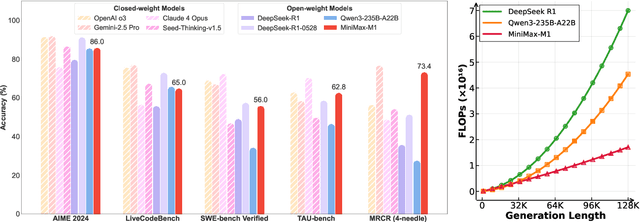

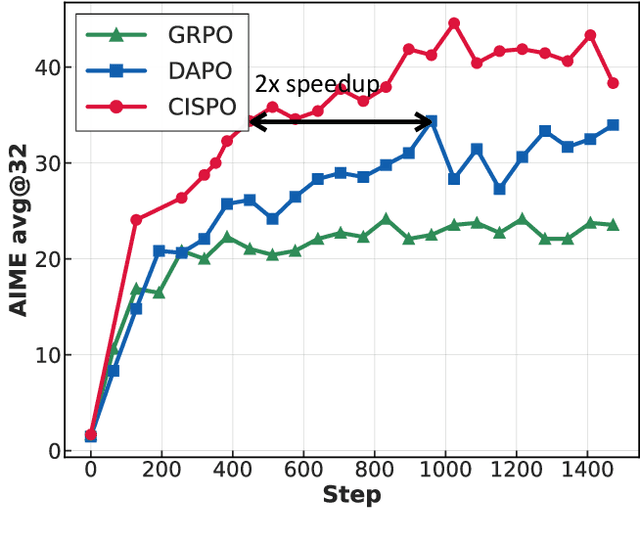
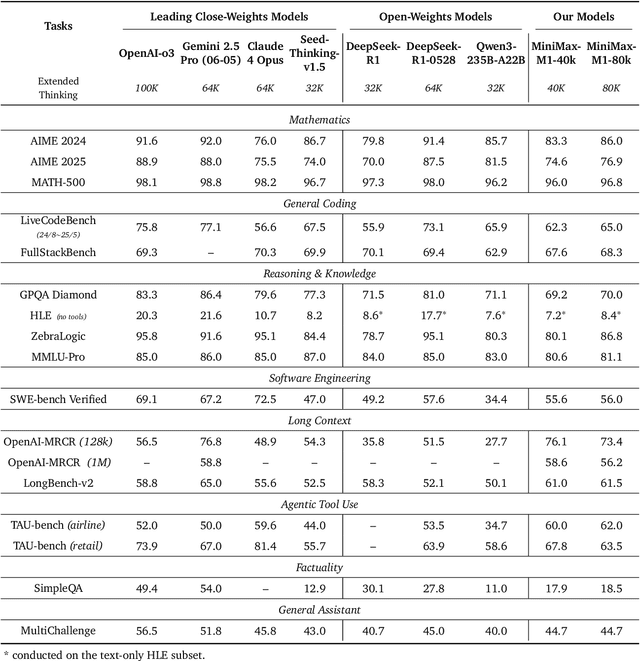
Abstract:We introduce MiniMax-M1, the world's first open-weight, large-scale hybrid-attention reasoning model. MiniMax-M1 is powered by a hybrid Mixture-of-Experts (MoE) architecture combined with a lightning attention mechanism. The model is developed based on our previous MiniMax-Text-01 model, which contains a total of 456 billion parameters with 45.9 billion parameters activated per token. The M1 model natively supports a context length of 1 million tokens, 8x the context size of DeepSeek R1. Furthermore, the lightning attention mechanism in MiniMax-M1 enables efficient scaling of test-time compute. These properties make M1 particularly suitable for complex tasks that require processing long inputs and thinking extensively. MiniMax-M1 is trained using large-scale reinforcement learning (RL) on diverse problems including sandbox-based, real-world software engineering environments. In addition to M1's inherent efficiency advantage for RL training, we propose CISPO, a novel RL algorithm to further enhance RL efficiency. CISPO clips importance sampling weights rather than token updates, outperforming other competitive RL variants. Combining hybrid-attention and CISPO enables MiniMax-M1's full RL training on 512 H800 GPUs to complete in only three weeks, with a rental cost of just $534,700. We release two versions of MiniMax-M1 models with 40K and 80K thinking budgets respectively, where the 40K model represents an intermediate phase of the 80K training. Experiments on standard benchmarks show that our models are comparable or superior to strong open-weight models such as the original DeepSeek-R1 and Qwen3-235B, with particular strengths in complex software engineering, tool utilization, and long-context tasks. We publicly release MiniMax-M1 at https://github.com/MiniMax-AI/MiniMax-M1.
PROPHET: An Inferable Future Forecasting Benchmark with Causal Intervened Likelihood Estimation
Apr 02, 2025Abstract:Predicting future events stands as one of the ultimate aspirations of artificial intelligence. Recent advances in large language model (LLM)-based systems have shown remarkable potential in forecasting future events, thereby garnering significant interest in the research community. Currently, several benchmarks have been established to evaluate the forecasting capabilities by formalizing the event prediction as a retrieval-augmented generation (RAG) and reasoning task. In these benchmarks, each prediction question is answered with relevant retrieved news articles. However, because there is no consideration on whether the questions can be supported by valid or sufficient supporting rationales, some of the questions in these benchmarks may be inherently noninferable. To address this issue, we introduce a new benchmark, PROPHET, which comprises inferable forecasting questions paired with relevant news for retrieval. To ensure the inferability of the benchmark, we propose Causal Intervened Likelihood (CIL), a statistical measure that assesses inferability through causal inference. In constructing this benchmark, we first collected recent trend forecasting questions and then filtered the data using CIL, resulting in an inferable benchmark for event prediction. Through extensive experiments, we first demonstrate the validity of CIL and in-depth investigations into event prediction with the aid of CIL. Subsequently, we evaluate several representative prediction systems on PROPHET, drawing valuable insights for future directions.
RefineCoder: Iterative Improving of Large Language Models via Adaptive Critique Refinement for Code Generation
Feb 13, 2025Abstract:Code generation has attracted increasing attention with the rise of Large Language Models (LLMs). Many studies have developed powerful code LLMs by synthesizing code-related instruction data and applying supervised fine-tuning. However, these methods are limited by teacher model distillation and ignore the potential of iterative refinement by self-generated code. In this paper, we propose Adaptive Critique Refinement (ACR), which enables the model to refine itself by self-generated code and external critique, rather than directly imitating the code responses of the teacher model. Concretely, ACR includes a composite scoring system with LLM-as-a-Judge to evaluate the quality of code responses and a selective critique strategy with LLM-as-a-Critic to critique self-generated low-quality code responses. We develop the RefineCoder series by iteratively applying ACR, achieving continuous performance improvement on multiple code generation benchmarks. Compared to the baselines of the same size, our proposed RefineCoder series can achieve comparable or even superior performance using less data.
A Comprehensive Evaluation on Event Reasoning of Large Language Models
Apr 26, 2024



Abstract:Event reasoning is a fundamental ability that underlies many applications. It requires event schema knowledge to perform global reasoning and needs to deal with the diversity of the inter-event relations and the reasoning paradigms. How well LLMs accomplish event reasoning on various relations and reasoning paradigms remains unknown. To mitigate this disparity, we comprehensively evaluate the abilities of event reasoning of LLMs. We introduce a novel benchmark EV2 for EValuation of EVent reasoning. EV2 consists of two levels of evaluation of schema and instance and is comprehensive in relations and reasoning paradigms. We conduct extensive experiments on EV2. We find that LLMs have abilities to accomplish event reasoning but their performances are far from satisfactory. We also notice the imbalance of event reasoning abilities in LLMs. Besides, LLMs have event schema knowledge, however, they're not aligned with humans on how to utilize the knowledge. Based on these findings, we introduce two methods to guide the LLMs to utilize the event schema knowledge. Both methods achieve improvements.
A Survey on Self-Evolution of Large Language Models
Apr 22, 2024



Abstract:Large language models (LLMs) have significantly advanced in various fields and intelligent agent applications. However, current LLMs that learn from human or external model supervision are costly and may face performance ceilings as task complexity and diversity increase. To address this issue, self-evolution approaches that enable LLM to autonomously acquire, refine, and learn from experiences generated by the model itself are rapidly growing. This new training paradigm inspired by the human experiential learning process offers the potential to scale LLMs towards superintelligence. In this work, we present a comprehensive survey of self-evolution approaches in LLMs. We first propose a conceptual framework for self-evolution and outline the evolving process as iterative cycles composed of four phases: experience acquisition, experience refinement, updating, and evaluation. Second, we categorize the evolution objectives of LLMs and LLM-based agents; then, we summarize the literature and provide taxonomy and insights for each module. Lastly, we pinpoint existing challenges and propose future directions to improve self-evolution frameworks, equipping researchers with critical insights to fast-track the development of self-evolving LLMs.
EVIT: Event-Oriented Instruction Tuning for Event Reasoning
Apr 18, 2024



Abstract:Events refer to specific occurrences, incidents, or happenings that take place under a particular background. Event reasoning aims to infer events according to certain relations and predict future events. The cutting-edge techniques for event reasoning play a crucial role in various natural language processing applications. Large language models (LLMs) have made significant advancements in event reasoning owing to their wealth of knowledge and reasoning capabilities. However, smaller instruction-tuned models currently in use do not consistently demonstrate exceptional proficiency in managing these tasks. This discrepancy arises from the absence of explicit modeling of events and the interconnections of them within their instruction data. Consequently, these models face challenges in comprehending event structures and semantics while struggling to bridge the gap between their interpretations and human understanding of events. Additionally, their limitations in grasping event relations lead to constrained event reasoning abilities to effectively deduce and incorporate pertinent event knowledge. In this paper, we propose Event-Oriented Instruction Tuning (EvIT) to train our LLM. Specifically, we first propose a novel structure named event quadruple which contains the structure and semantics of events and is complete in the event representation. We then design event-relation learning based on the structures. We encapsulate the learning into the instruction-tuning formulation to better stimulate the event reasoning capacity of our model. We design a heuristic unsupervised method to mine event quadruple from a large-scale corpus. At last, we finetune a Llama model on our Event-Oriented Instruction Tuning. We conduct extensive experiments on event reasoning tasks on several datasets. Automatic and human evaluations demonstrate EvIT achieves competitive performances on event reasoning.
MEEL: Multi-Modal Event Evolution Learning
Apr 16, 2024



Abstract:Multi-modal Event Reasoning (MMER) endeavors to endow machines with the ability to comprehend intricate event relations across diverse data modalities. MMER is fundamental and underlies a wide broad of applications. Despite extensive instruction fine-tuning, current multi-modal large language models still fall short in such ability. The disparity stems from that existing models are insufficient to capture underlying principles governing event evolution in various scenarios. In this paper, we introduce Multi-Modal Event Evolution Learning (MEEL) to enable the model to grasp the event evolution mechanism, yielding advanced MMER ability. Specifically, we commence with the design of event diversification to gather seed events from a rich spectrum of scenarios. Subsequently, we employ ChatGPT to generate evolving graphs for these seed events. We propose an instruction encapsulation process that formulates the evolving graphs into instruction-tuning data, aligning the comprehension of event reasoning to humans. Finally, we observe that models trained in this way are still struggling to fully comprehend event evolution. In such a case, we propose the guiding discrimination strategy, in which models are trained to discriminate the improper evolution direction. We collect and curate a benchmark M-EV2 for MMER. Extensive experiments on M-EV2 validate the effectiveness of our approach, showcasing competitive performance in open-source multi-modal LLMs.
 Add to Chrome
Add to Chrome Add to Firefox
Add to Firefox Add to Edge
Add to Edge